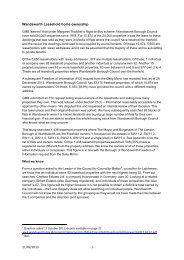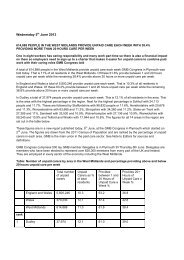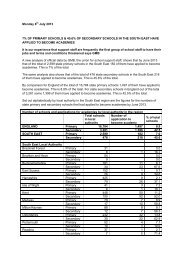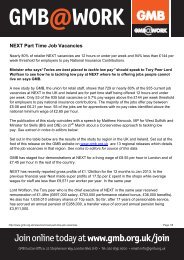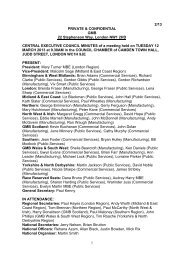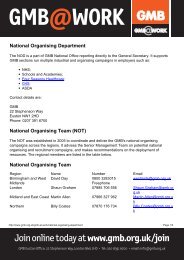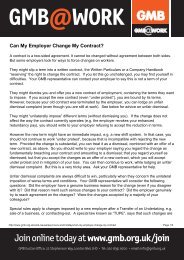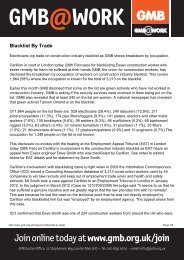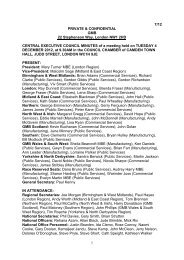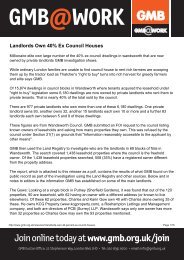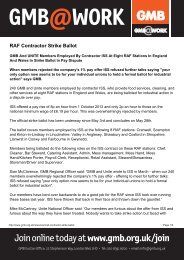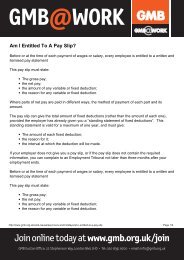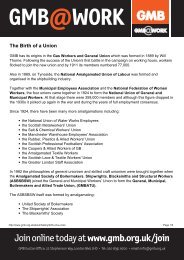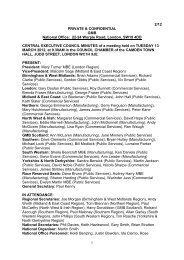WO toolkit 2012 complete.pdf - GMB
WO toolkit 2012 complete.pdf - GMB
WO toolkit 2012 complete.pdf - GMB
You also want an ePaper? Increase the reach of your titles
YUMPU automatically turns print PDFs into web optimized ePapers that Google loves.
SECTION 3.1<br />
COLLECTIVE BARGAINING GUIDELINES<br />
1. Always make sure every member has had a say in deciding what <strong>GMB</strong>’s position is.Give yourself time<br />
to do this properly but always consult your members before putting a union view to management.<br />
On a pay claim for example,hold several meetings for members and include a survey form in your<br />
workplace newsletter asking for their view.<br />
2. Make sure you let all your members know after you have met with management exactly what is<br />
happening.<br />
3. Always make sure your members hear about the latest negotiations from <strong>GMB</strong> first and not from<br />
their employer,using your workplace newsletters.<br />
4. Always remember: A collective negotiation with your employer should be done openly and publicly<br />
and is a great time to attract new members to <strong>GMB</strong>.<br />
5. Avoid private or‘off the record’discussions with managers,as a rule of thumb any meeting your<br />
employer suggests that you would be embarrassed to tell your members about should be avoided.<br />
6. <strong>GMB</strong> policy is that no deal can be signed with an employer until all the <strong>GMB</strong> members affected have<br />
been balloted.You do not have the authority to reach an agreement without consulting the<br />
members you represent.<br />
7. Avoid pressure from your employer to settle negotiations quickly,in many discussions our<br />
members benefit from a longer process.A longer process also gives you the time you need to use<br />
the consultation process to recruit and organise and make <strong>GMB</strong> stronger.<br />
8. Always have a claim on the table,for improved pay,shorter hours,a safer working environment or<br />
whatever your members are concerned about.You may also wish to include general issues such as<br />
pensions,training and equality.<br />
As a representative of <strong>GMB</strong> you come under the jurisdiction of your <strong>GMB</strong> Regional Committee.You are<br />
obliged by <strong>GMB</strong>’s rules to abide by the democratically agreed policy of the union.If you are in any doubt<br />
as to the effect of <strong>GMB</strong> policy on any situation that you face in your capacity as a workplace<br />
representative you should consult your Branch Secretary or <strong>GMB</strong> Officer.<br />
It is possible that even a new <strong>GMB</strong> Workplace Organiser will become involved in the negotiations<br />
affecting the pay and conditions of the members you represent.So it is vital that you understand in<br />
general terms how this is done.<br />
There are some general rules on the conduct of negotiations,which you should understand before you<br />
enter negotiations for the first time.You may be doing this as part of a committee with other <strong>GMB</strong><br />
representatives and quite possibly representatives from other unions.Discuss any concerns you have<br />
with your <strong>GMB</strong> Officer or other <strong>GMB</strong> Representatives before negotiations start.<br />
Your <strong>GMB</strong> Officer may also be involved in negotiations with management but will always be on hand to<br />
advice you.<br />
Note:<br />
Section 181 of the 1992 Trade Union Labour Relations Consolidation Act gives you the right to<br />
information from the employer for the purposes of collective representation.



